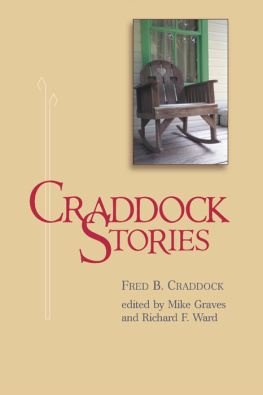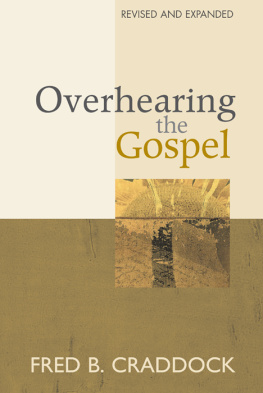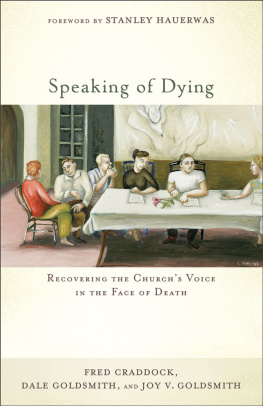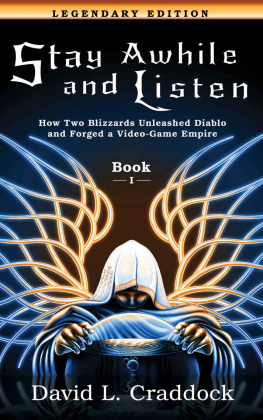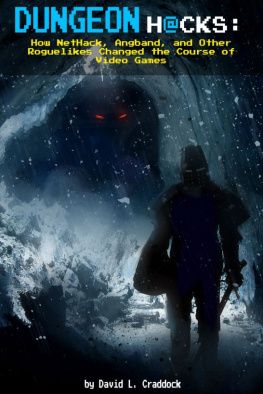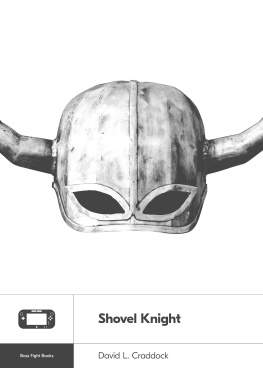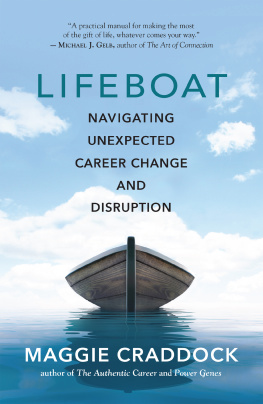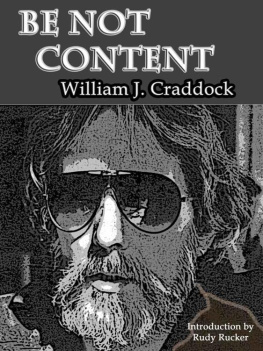Fred B Craddock - Craddock Stories
Here you can read online Fred B Craddock - Craddock Stories full text of the book (entire story) in english for free. Download pdf and epub, get meaning, cover and reviews about this ebook. year: 2001, publisher: Chalice Press, genre: Detective and thriller. Description of the work, (preface) as well as reviews are available. Best literature library LitArk.com created for fans of good reading and offers a wide selection of genres:
Romance novel
Science fiction
Adventure
Detective
Science
History
Home and family
Prose
Art
Politics
Computer
Non-fiction
Religion
Business
Children
Humor
Choose a favorite category and find really read worthwhile books. Enjoy immersion in the world of imagination, feel the emotions of the characters or learn something new for yourself, make an fascinating discovery.
- Book:Craddock Stories
- Author:
- Publisher:Chalice Press
- Genre:
- Year:2001
- Rating:5 / 5
- Favourites:Add to favourites
- Your mark:
- 100
- 1
- 2
- 3
- 4
- 5
Craddock Stories: summary, description and annotation
We offer to read an annotation, description, summary or preface (depends on what the author of the book "Craddock Stories" wrote himself). If you haven't found the necessary information about the book — write in the comments, we will try to find it.
One of the things that makes Fred Craddocks sermons so compelling is his masterful use of storytelling, but, until now, few of his stories have ever been published. This collection offers for the first time hundreds of Craddock stories told in his own words and a glimpse of his life.
Craddock Stories — read online for free the complete book (whole text) full work
Below is the text of the book, divided by pages. System saving the place of the last page read, allows you to conveniently read the book "Craddock Stories" online for free, without having to search again every time where you left off. Put a bookmark, and you can go to the page where you finished reading at any time.
Font size:
Interval:
Bookmark:


When I was in my late teens, I wanted to be a preacher. When I was in my late twenties, I wanted to be a good preacher. Now that I am older, I want more than anything else to be a Christian. To live simply, to love generously, to speak truthfully, to serve faithfully, and leave everything else to God.
Fred B. Craddock

2001 Fred B. Craddock
All rights reserved. For permission to reuse content, please contact Copyright Clearance Center, 222 Rosewood Drive, Danvers, MA 01923, (978) 750-8400, www.copyright.com.
The publishers have generously given permission to use extended quotations from the following works by Fred B. Craddock:
Praying Through Clenched Teeth. In The Twentieth Century Pulpit, vol. 2. Edited by James W. Cox. Nashville: Abingdon Press, 1981.
Overhearing the Gospel. Nashville: Abingdon Press, 1978.
As One Without Authority. St. Louis: Chalice Press, 2001.
On Being Pentecostal. In Best Sermons 1. Edited by James W. Cox. San Francisco: Harper and Row, 1988.
Have You Ever Heard John Preach? In Best Sermons 4. Edited by James W. Cox. New York: HarperCollins, 1991.
Cover photo: Nancy Anne Dawe
Cover design: Lynne Condellone
Interior design: Elizabeth Wright
Interior photo: Bill Mahan, Cherry Log Christian Church
Art direction: Michael Domnguez
Visit Chalice Press on the World Wide Web at
www.chalicepress.com
10 9 8 7 6 07 08 09 10 11 12
Library of Congress CataloginginPublication Data
Craddock, Fred B.
Craddock stories / by Fred B. Craddock; edited by Mike Graves and Richard F. Ward.
p. cm.
ISBN-10: 0-827204-83-3
ISBN-13: 978-0-827204-83-6
(pbk.: alk. paper)
1. Story sermons. 2. Sermons, American. I. Graves, Mike. II. Ward, Richard F. III. Title.
BV4307.S7 C73 2001
252.0663dc21 2001000777
Printed in the United States of America
For the ministries of
Fred and Nettie Craddock,

It has been said that some things are too important to do alone, like church, for instance. Of course, some projects are too big to do alone, like this collection. Therefore, we wish to thank the following: Jon L. Berquist, for his patient and perceptive editorial eye; our graduate assistants, especially Nicole Finkelstein-Blair and A. J. Ballou, who transcribed hours upon hours of Fred Craddocks sermons; the various churches, seminary librarians, and regional offices of the Christian Church (Disciples of Christ) for all their help in securing tapes of sermons; our families, who encouraged us along the way; the faith and learning communities of Central Baptist Theological Seminary in Kansas City and Iliff School of Theology in Denver, who support us; George Nikas and Marilyn Schertz of CST Media; and the saints of the Cherry Log Christian Church (Disciples of Christ), who so graciously welcomed us into their community of faith.
There is a preacher I know who has a clay figurine called Pueblo Storyteller in her study. You may have seen this figure before, as it is quite prolific these days. Pueblo Storyteller is showing up in homes everywhere, near fireplaces, in living rooms, libraries, dens, and on mantles. He is the creation of Helen Cordero, a Native American potter of the Cochita Pueblos who, in 1964, wanted to honor the memory of her grandfather. Known among the Cochitas as a gifted storyteller, Santiago Quintana wanted the traditions of his people preserved, especially in the memories of the children. Come children, it is time! And the children would gather around him to listen to his stories of the people, Cordero remembers.
She has captured this image in clay and painted it in the colors of earth and sky. The Storytellers eyes are closed, but the mouth is opened to a round O. His eyes are closed because all storytellers have to keep a steady gaze on their inner worlds of memory, perception, and imagination; his mouth is open in order to transport others through the medium of sound, language, and imagery. Children are attached to the Storyteller in various places and exhibit a variety of emotional attitudes and facial expressionsone is crying in the cradle of his arm; one is sleeping in his lap; one is climbing to the top of his head; and another is listening peacefully on his knee.
We, of course, could be any one of them. Or we could sit in the Storytellers place. As preachers of the gospel of Jesus Christ, we are entrusted with stories others have been telling for ages and will be telling for ages to come. Do we attach ourselves to these gospel stories, or have they attached themselves to us? No matter. In either case, we sit in those holy spaces they create, and there we laugh, weep, rest, or remain restless.
We also look deeply into our own hearts in order to tell our stories of faithto give an account of those places where we too have encountered the living Christ. This is why Fred Craddock has been the Storyteller for many of us. We cling to the stories he tells, not simply because they comfort us, make us laugh or cry, or leave us scratching our heads. We cling to them because we hear in them both dissonance and harmony between our stories and the stories of God.
It is not surprising that the Pueblo Storyteller sits very close to the Craddock books on this preachers shelf. We certainly know Fred as a teacher of preachers. Fred opened the door to inductive preaching for a generation of preachers and revived the work of many who had been preaching for a long time. This method of preaching changed many preachers thoughts about the ways that narrative material is brought into the service of the sermon. Simply put, an inductive method of preaching starts in the middle of human experience and moves from there to conclusions about the gospel. It is counterpoint to another method of preaching, deductive, which states a truth in the form of a general proposition or conclusion, then breaks it down into points, instructions, and conclusions. In deductive preaching, stories and anecdotes are brought into service in the sermon to illustrate the points, little adornments that help dress the sermon up for church. Fred shows us that stories have a different sort of work to do in proclamation. What we experience in Freds stories is the revelatory power of the gospel even while its wisdom remains hidden from the world.
Freds homiletic has proven to be a capstone in the homiletical household for more than three decades. Even so, a good many preachers and other folk scratch their heads and say, Craddock? I think I have heard about him but cant say that I ever heard him! To read through the stories in this book is certainly not the same experience as hearing him tell them. It is our hope, however, that by reading through them you can catch a glimpse of Fred Craddock. We have attempted to capture elements of the oral style in which Fred speaks. Read the stories out loud and listen to the rhythms of ordinary speech that have extraordinary powerto reveal and conceal, to comfort and convict, to delight and teach. For those of you who read these stories for the first time, we hope that you will find him here, pointing to places in his life where the truth of the Christian gospel broke through into the clearing. Others will be listening to these stories again. That is the nature of storiesthey live to be told and retold in Gods loop of memory and imagination.
Font size:
Interval:
Bookmark:
Similar books «Craddock Stories»
Look at similar books to Craddock Stories. We have selected literature similar in name and meaning in the hope of providing readers with more options to find new, interesting, not yet read works.
Discussion, reviews of the book Craddock Stories and just readers' own opinions. Leave your comments, write what you think about the work, its meaning or the main characters. Specify what exactly you liked and what you didn't like, and why you think so.

